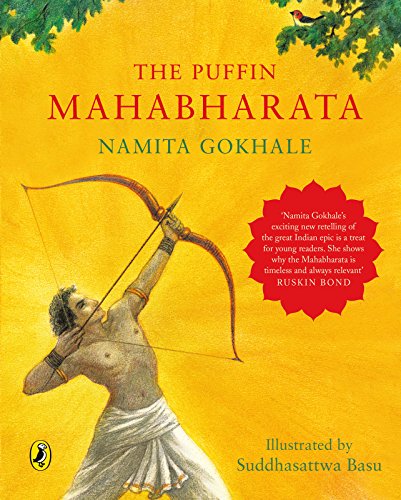The first dilemma which confronts the reviewer of any of the multiple retellings of India’s two great epics is the choice of an appropriate yardstick for assessing the book. It would obviously be unfair—indeed, faintly ridiculous—to compare it with the original. Vyasa’s Mahabharata was written at a different time, in a different medium, for a different audience, by one of the greatest poets in the history of the world. In decades—perhaps centuries—that followed, other equally skilled hands fleshed it out till, spanning more than 80,000 verses it became the world’s longest epic. To capture its essence in a mere 185 pages—including 30 odd pages of illustrations and a few pages of glossary—would be a challenge for anybody. Let me be clear. This is not a criticism of Namita Gokhale’s beautiful book but, somewhat hesitatingly, it takes issue with the comments by two very famous literary figures (both of whom, incidentally, this reviewer greatly admires) quoted on the back cover of the book. One says that this rendition ‘retains the essential structure of the narrative without diluting its epic proportions.’
Another begins her tribute by saying, ‘Without sacrificing the complexities of either the narrative or the characters…’ (In both quotes, italics added). This kind of extravagant and, to me, irrelevant, praise misses the point. Of course, the author has no option but to ‘dilute’ Mahabharata’s ‘epic proportions’. And, it is not her fault, that such a short version cannot capture the ‘complexities’ of either the narratives or the characters.
Being an accomplished novelist the author narrates the famous but intricate tale—or, shall we say, multitudinous intertwining tales—with ease and simplicity, moving smoothly from one dramatic episode to the next. Inevitably, episodes had to be picked and chosen. Many important incidents had to be dropped or passed over speedily. Take for instance, Gokhale does record the pre-battle negotiations between the two increasingly hostile camps. In this she includes the dispatch by Kauravas of Sanjay as emissary to the Pandavas. He is sent back with a clear terse ultimatum: Justice or war. However, somewhat inexplicably, she misses out the famous offer of Yudhisthara to settle for just five villages.

